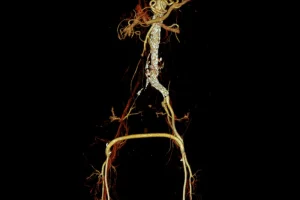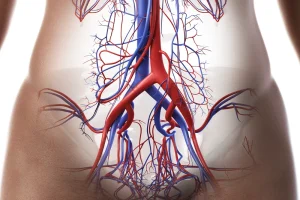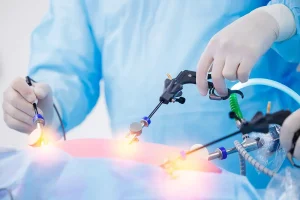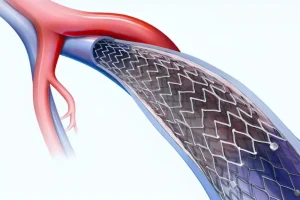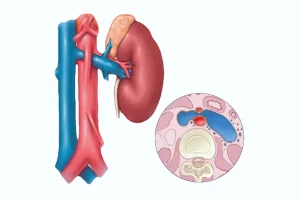
Endarterectomy is an advanced and effective solution for treating arterial blockages caused by atherosclerosis, preventing serious complications such as stroke or peripheral ischemia.
At our clinic, interventions are performed by a team of experienced vascular surgeons, using state-of-the-art technology and adhering to the highest medical standards. Whether you are experiencing symptoms of arterial stenosis or looking for a solution to prevent recurrences, we are here to help you regain your health and quality of life.
Discover how endarterectomy may be the right solution for you!
Book an Appointment
What is an Endarterectomy?
Endarterectomy is a surgical procedure used to remove blockages in arteries affected by atherosclerosis. The goal of this surgery is to prevent strokes and improve blood flow to the brain or other parts of the body. At our clinic, our team of experienced vascular surgeons use the latest techniques to ensure the safety and success of the procedure.
When is endarterectomy recommended?
This procedure is indicated in the following cases:
- Severe blockage of the carotid artery (>70%);
- Previous stroke or transient ischemic attack (TIA);
- Symptoms associated with carotid artery disease such as weakness, numbness or slurred speech.
Advantages of endarterectomy
- Reduced risk of stroke;
- Restoring normal blood flow;
- Reduce ischemic symptoms;
- Prevention of transient ischemic attack (TIA);
- Improve quality of life;
- Safe and effective technique;
- Prevent progression of atherosclerosis;
- Alternative to other invasive treatments;
- Reduce the risk of amputation (in case of peripheral ischemia);
- Personalized intervention.
Pre-operative preparation
Before surgery, your doctor will perform a series of tests to assess the severity of the blockage and your general health. These tests include:
- Doppler ultrasound;
- CT angiography or MRI;
- Detailed clinical evaluation.
What happens during the operation?
The procedure usually takes several hours and is performed under general or local anesthesia. The main steps include:
- Opening the carotid artery through a neck incision;
- Removal of the plaque blocking blood flow;
- Closing the artery and incision with stitches.
A special temporary tube may be used to ensure blood circulation during the procedure.
Endarterectomy procedures available
Postoperative recovery
After surgery, you will stay in hospital for 24 hours for monitoring. You may experience the following symptoms during the recovery period:
- Discomfort or swelling in the incision area;
- Numbness or difficulty swallowing.
Your doctor will most likely advise you to avoid physical exertion for two weeks and guide you on how to resume your daily activities.
Advantages of treatment at VenArt Clinic
- Our team consists of renowned vascular surgeons;
- State-of-the-art technology for diagnosis and treatment;
- Personalized monitoring before and after surgery.
Our Medical Team
Frequently Asked Questions
What is endarterectomy?
It is a surgical procedure that involves the removal of atheroma plaques inside the arteries to restore normal blood flow.
When is endarterectomy recommended?
It is recommended in cases of severe carotid stenosis (over 70%), transient ischemic attack (TIA), severe peripheral ischemia or after a stroke to prevent relapse.
Is it a painful procedure?
No, because it is performed under local or general anesthesia. After surgery, discomfort is minimal and can be managed with painkillers.
Can I drive or travel after surgery?
Most patients are able to return to normal activities, including driving, within a few days after surgery, as recommended by their doctor.
What are the risks of endarterectomy?
Like any surgery, there are risks such as bleeding, infection, nerve damage or, rarely, stroke. However, these are minimal if the procedure is carried out by a specialist.
Is endarterectomy a permanent solution?
The procedure significantly reduces the risk of complications, but patients need to maintain a healthy lifestyle to prevent new atherosclerotic plaque formation.
How long is the recovery time after endarterectomy?
Recovery varies from a few days to a few weeks, depending on your general state of health and the complexity of the procedure.
How do I prepare for the procedure?
Your doctor will advise you to stop certain medications, have pre-operative tests and eat a balanced diet before surgery.
Who can perform this procedure?
Endarterectomy should be performed by an experienced vascular surgeon in a specialized medical center.

